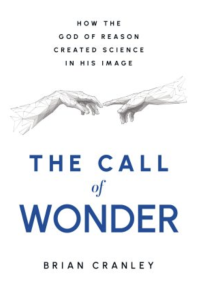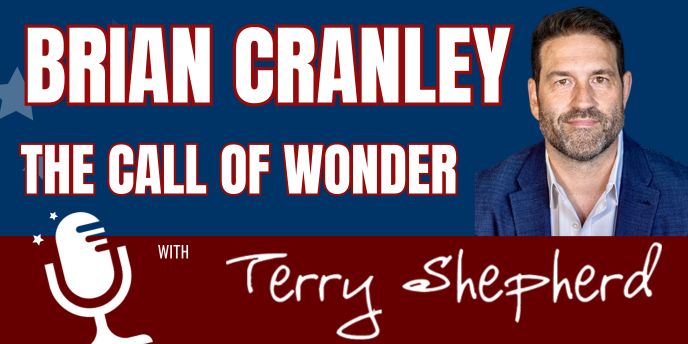Hear the Conversation | Get the Book
 In the bottomless scroll of YouTube’s algorithmic curiosity cabinet, Brian Cranley found a quiet revelation. The video, produced by Fermilab, traced the unfathomable beginnings of the universe—an account of the Big Bang rendered in the measured tones of a science communicator with good posture. For most, it was an explainer, another window into a cold, luminous past. For Cranley, it was a prayer answered in the language of quarks.
In the bottomless scroll of YouTube’s algorithmic curiosity cabinet, Brian Cranley found a quiet revelation. The video, produced by Fermilab, traced the unfathomable beginnings of the universe—an account of the Big Bang rendered in the measured tones of a science communicator with good posture. For most, it was an explainer, another window into a cold, luminous past. For Cranley, it was a prayer answered in the language of quarks.
A medical device salesman by day and an amateur metaphysicist by disposition, Cranley straddles an unusual intersection: biomedical engineering and seminary theology. He is, as he puts it, “a weird one.” But there was nothing weird, at least to him, about the moment when the Fermilab narrator spoke of a state of “perfect unity” at the birth of time, when energy and matter were indistinct, when the four forces of nature had not yet drifted into separation. The phrase flicked a switch, illuminating memories of Aquinas and Aristotle, of syllogisms scribbled long ago in theological margins. “It sounded,” he remembers, “exactly like divine simplicity.” The echo would not leave him. The idea swelled in the silence after the video ended, lodged in the heart like a psalm or a theorem. It had to be written down, not because he fancied himself an author, but because not writing it became a kind of ache.
The result is The Call of Wonder, a book both earnest and audacious in its ambition: to reconcile the modern divorce between science and faith. The subtitle might well be “A Treatise on Impossible Conversations.” But Cranley’s argument is less confrontational than it is conciliatory. He does not seek to vanquish Richard Dawkins or prove the Resurrection with particle physics. Instead, he reclaims something older, and perhaps more radical, the idea that faith and reason were once allies. That they could be again.
Cranley’s background helps. He talks like an engineer, thinks like a philosopher, and hustles like a salesman. His speech is peppered with citations from both scripture and science podcasts. He can move, seamlessly and without pretension, from Aquinas to abiogenesis. “People think these are two different languages,” he says, “but really, it’s the same logic applied to different mysteries.” This is not an argument for a “God of the gaps,” the theological equivalent of duct tape for scientific ignorance. It is, instead, an argument for coherence. For consonance. For a cosmos that hums in harmony even when we can only hear one note at a time.
At the heart of the book lies a provocative assertion: that the most enduring scientific puzzles, how something came from nothing, how life emerged from the inanimate, how the mind arose from matter, are not merely technical problems, but philosophical invitations. These events, Cranley suggests, are miracles not because they defy natural law, but because they reveal its strange generosity. “We can’t recreate a universe. We can’t make a living cell. And we don’t understand consciousness,” he says, not with despair, but with awe. “That’s the pattern. That’s how God seems to work.”
It’s an observation as old as it is unfashionable: that miracles, scripturally speaking, do not break the world. They illuminate it. The bush burns but is not consumed. The water becomes wine, but the wedding still ends. Even the Resurrection insists on materiality, wounds that can be touched, bread that can be broken. For Cranley, this is not allegory but architecture. God does not crash the system. He writes himself into its code.
Wonder, then, is not an emotional byproduct of ignorance, but a response to contact. “Authentic wonder,” Cranley writes, “is the shared experience of philosophers, scientists, and theologians alike.” It is the pulse beneath Kepler’s equations and Augustine’s confessions. It is the breath caught at the sight of Saturn’s rings or a child’s ultrasound. And it is, crucially, a call. Not the shriek of superstition, but the beckoning of beauty toward meaning.
The humility required to respond to that call is, perhaps, the rarest resource of all. In a cultural moment drunk on certainty, where every tweet is a verdict and every fact a cudgel, Cranley’s posture is almost monastic. He invokes the words of Frank Sheed, the twentieth-century Catholic apologist who described mystery not as the absence of knowledge, but as a depth so profound that one could never reach the bottom. For Cranley, mystery is not a wall but a well. “You go back, and you draw from it again. And every time, it’s more.”
There is something profoundly countercultural in all this. Cranley does not seek to win. He seeks to witness. His book is not a polemic, but a pilgrimage. It wanders through metaphysics and microbiology with the gentle stubbornness of someone who has learned to live in questions. He is not looking for applause. He is looking for resonance.
And yet, there’s a pragmatism to his idealism. His recommendations are not monastic retreats or theological treatises. They are walks. Fifteen minutes a day. A trip to a natural history museum. A slow look at the stars. “Just let it do its thing on you,” he says. As if wonder were not something to be chased, but something always waiting to be noticed.
In The Call of Wonder, Cranley makes an old argument sound new again: that the cosmos is not divided into camps but woven of a single fabric, one that stretches from Genesis to Galileo to Google. That to speak both science and faith fluently is not betrayal, but fidelity. And that perhaps the most rational response to a rational universe is reverence.

